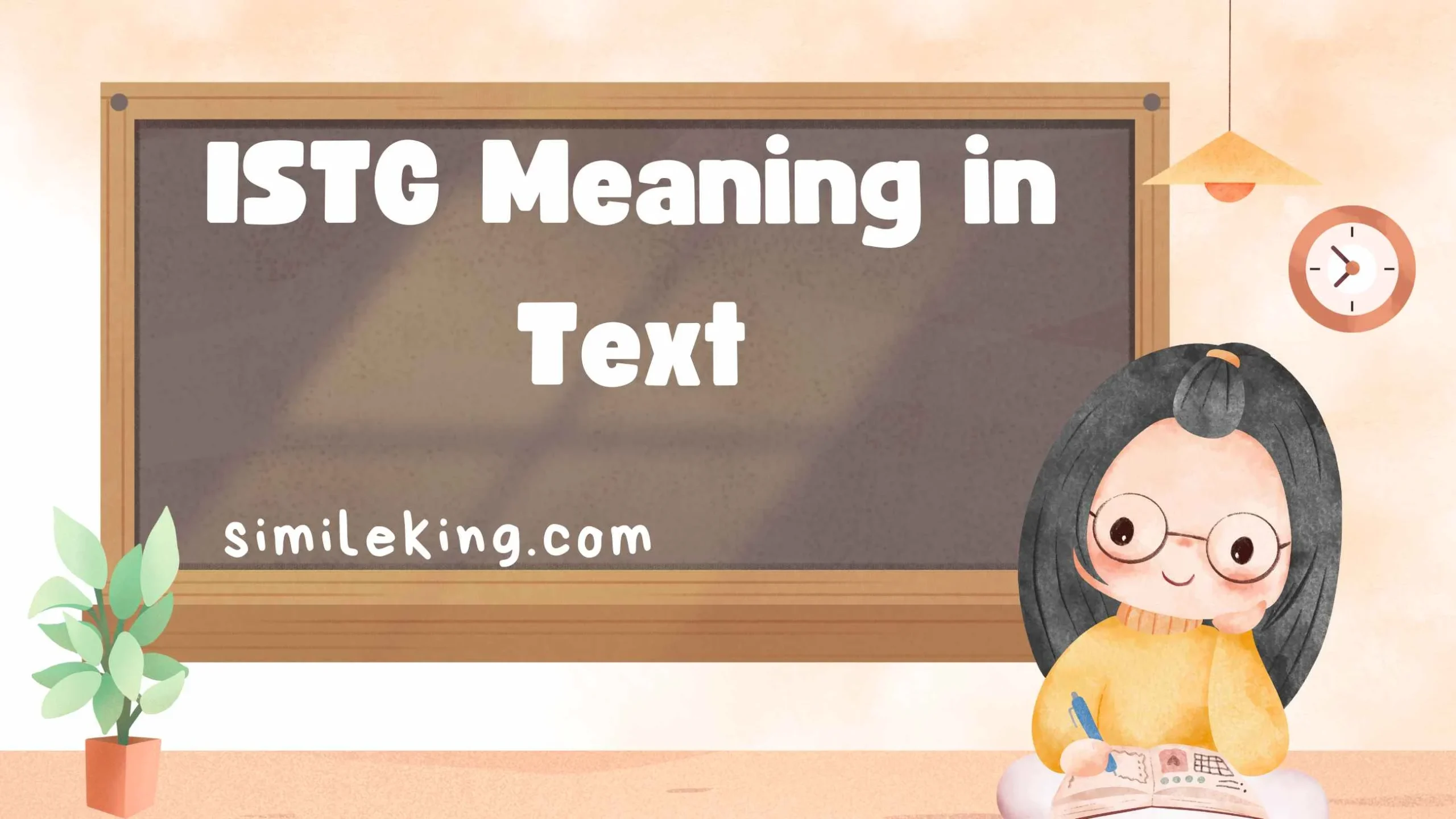In 2025, digital communication continues to evolve at a rapid pace. From short-form messaging on platforms like Instagram, TikTok, and Snapchat to professional exchanges on LinkedIn and email, language online has taken on new forms. Abbreviations, acronyms, and slang terms dominate texting culture, making messages faster, more expressive, and often more emotional.
One term that remains highly relevant—and often misunderstood—is ISTG. If you’ve come across it in chats, comments, or tweets, you may have wondered what it truly means, how it’s used, and whether it’s appropriate in different contexts.
This article will serve as the most in-depth and updated guide (2025 edition) on ISTG meaning in text, exploring its definition, origin, usage across platforms, tone, professional and casual alternatives, and real-life examples. By the end, you’ll not only know exactly what it stands for but also how to use (or avoid) it strategically in conversation.
What Does ISTG Mean in Text?
ISTG stands for “I Swear To God.”
It’s a shorthand way of emphasizing sincerity, frustration, annoyance, or strong conviction in digital communication. People use it to make their statements feel more intense, authentic, or emotional.
For example:
- “ISTG, if this WiFi disconnects again, I’m done.”
- “ISTG, that show had me crying last night.”
The phrase originally emerged from spoken English as an oath or vow and transitioned into digital communication to make expressions shorter and sharper. In 2025, it’s one of the most common Gen Z and Gen Alpha texting acronyms, though millennials and older users understand it as well.
The Nuance of Tone in ISTG
ISTG is versatile, but its tone shifts depending on the context. It can sound casual, serious, or even aggressive, which makes it important to understand before using it.
1. Sincere Expression
When someone wants to show they mean something wholeheartedly.
- “ISTG, you’re the only one who gets me.”
2. Frustration or Anger
Used in moments of irritation or warning.
- “ISTG, if he interrupts me one more time…”
3. Emphasis in Storytelling
Adds drama or flair when telling a story.
- “ISTG, the way she looked at me was hilarious.”
4. Playful or Casual Tone
Lighthearted, used between friends for fun exaggeration.
- “ISTG, this pizza is life.”
⚠️ Caution: In professional or formal settings, ISTG may come across as unprofessional or even offensive because it invokes God’s name. Knowing alternatives is essential.
ISTG in 2025: Why It’s Still Trending
Even with the rise of AI-driven chat tools, voice notes, and video communication, short acronyms like ISTG remain popular for several reasons:
- Speed – People prefer quick abbreviations over typing long sentences.
- Emotional Punch – It carries weight and intensity that “I promise” or “seriously” doesn’t fully capture.
- Cross-Platform Appeal – Works equally well on TikTok comments, Twitter threads, or private DMs.
- Gen Z & Alpha Slang – Younger generations embrace acronyms as part of identity and group belonging.
- Memetic Spread – ISTG often appears in memes, reaction posts, and viral content, keeping it alive.
Alternatives to ISTG (Polite, Professional, and Casual Options)
While ISTG is expressive, it’s not always the right choice—especially in professional or polite conversations. Below are refined alternatives, categorized by tone.
Polite Alternatives
- “Honestly” – Gentle and clear without being dramatic.
- “Honestly, I didn’t expect that reaction.”
- “Truly” – Formal and respectful.
- “Truly, your kindness means so much.”
- “I Promise” – Carries sincerity without religious connotation.
- “I promise I’ll be there on time.”
Professional Alternatives
- “I Assure You” – Common in workplace or academic settings.
- “I assure you, the report will be delivered by Monday.”
- “Rest Assured” – More formal, often used in customer service.
- “Rest assured, your order is being processed.”
- “I Can Guarantee” – Adds credibility and certainty.
- “I can guarantee the accuracy of these results.”
Casual Alternatives
- “No Cap” – Slang meaning “no lie,” very popular in Gen Z lingo.
- “No cap, that movie was amazing.”
- “Fr” (For Real) – Short, casual, often paired with emojis.
- “Fr, that test was brutal.”
- “Dead Serious” – Informal but effective in showing intensity.
- “I’m dead serious, you need to watch this show.”
- “I Mean It” – Casual but still emphasizes sincerity.
- “I mean it, you’re the best.”
Choosing the Right Alternative: Context Matters
Using ISTG or its alternatives depends on audience, tone, and platform.
- Friends/Informal Chats → ISTG, Fr, No Cap, Dead Serious.
- Professional Emails/Workplace → I Assure You, Rest Assured, I Can Guarantee.
- Polite Conversations → Honestly, Truly, I Promise.
👉 Rule of Thumb:
If the situation involves credibility, respect, or professionalism, avoid ISTG. If it’s lighthearted, personal, or casual, ISTG works fine.
10 Real-World Examples of ISTG in Text
Here are 10 fresh, user-friendly examples you can use or adapt in 2025:
- “ISTG, this group project is testing my patience.”
- “ISTG, if my phone dies one more time, I’m throwing it out.”
- “ISTG, that was the funniest thing I’ve ever seen.”
- “ISTG, you’re the only one I can trust with this.”
- “ISTG, my boss schedules meetings just to waste time.”
- “ISTG, if traffic doesn’t clear up, I’ll be late again.”
- “ISTG, this playlist is perfection.”
- “ISTG, I’ve told you a hundred times already.”
- “ISTG, she looked like she stepped out of a movie.”
- “ISTG, that game had my heart racing the whole time.”
Each example highlights different tones—frustrated, playful, sincere, or dramatic—to show the versatility of ISTG.
The Evolution of ISTG: 2025 Outlook
In 2025, ISTG is more than just a phrase—it reflects how language adapts in online spaces. Abbreviations evolve, some fade away, but ISTG remains because:
- It balances brevity with emotional depth.
- It’s easily understood across age groups.
- It continues to spread in memes, TikTok sounds, and viral captions.
Future variations might emerge (like “SWG” for “Swear to God”), but ISTG’s cultural staying power suggests it will remain a staple of digital slang for years to come.
Conclusion
ISTG means “I Swear To God”, a phrase that conveys sincerity, frustration, or strong emphasis in text. While widely used in casual conversations, it can feel unprofessional in formal contexts—making alternatives like “Honestly,” “I Assure You,” or “No Cap” useful depending on the audience.
As digital communication in 2025 becomes more fast-paced and creative, ISTG remains a powerful example of how language evolves to meet our emotional and practical needs. Whether you’re chatting with friends, writing a professional email, or posting online, knowing how to use or replace ISTG gives you an edge in communication.





